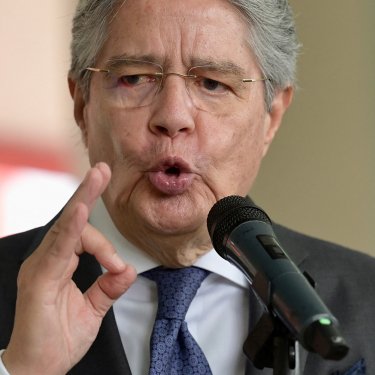Attempt by Ecuador’s government to silence investigative journalism

Reporters Without Borders (RSF) condemns Ecuadorean President Guillermo Lasso’s violent diatribes against the independent news website La Posta and calls on the government to respect investigative reporting by journalists, who are already threatened by Ecuador’s increasingly violent gang warfare
“A price has been put on my head by criminal organisations,” La Posta’s Venezuelan founder, Andersson Boscán, told RSF, adding that he had learned this from a police source. “But the worst of the threats is the one by the president on the national TV channel, the threat of waging a war against those who want to abuse freedom of expression,” added one of the website’s investigative reporters, Jefferson Sanguña.
Sanguña was referring to President Lasso’s televised address on 14 February, when he referred to La Posta’s investigative reporters as “media terrorists” and accused them of being linked to drug trafficking.
The attacks were prompted by La Posta’s publication of an investigative report entitled “The Big Godfather” on 9 January about a network of corruption, which led parliament to set up a commission of enquiry. The fruit of six months of investigations by seven La Posta reporters, the report revealed alleged influence peddling within state-owned companies involving the president's brother-in-law, and claimed that the Albanian mafia funded Lasso’s presidential election campaign.
“President Guillermo Lasso's threat of ‘war’ against journalists doing investigative reporting is a desperate attempt to silence them,” said Artur Romeu, the director of RSF’s Latin America bureau. “But he didn’t stop there. By trying to smear the journalists with clumsy accusations of colluding with drug traffickers, he is putting their lives in danger in a country embroiled in an increasingly violent gang war, one with ramifications both internationally and within the Ecuadorian state that require investigation. These absurd attacks must stop, and the government must respect investigative journalism, which is essential to the right to information in Ecuador.”
In the days following the publication of their first reports with information compromising for the government, La Posta’s journalists saw their personal data and photos of their loved-ones being posted on websites and on anonymous social media accounts. “We had to change our daily habits, our methods of moving around, and those of our family members,” La Posta co-founder and co-director Luis Eduardo Vivanco said.
Verbal attacks on the media by government officials have been common in Ecuador, but the climate had improved somewhat after President Rafael Correa’s departure in 2017. The new threats against journalists by President Lasso have exacerbated the violence of the environment for journalism in Ecuador, which is due in large measure to the growing power of criminal organisations linked to drug-trafficking.
